

Top 5 Essential SEO Reporting Tools for Agencies
source link: https://www.searchenginejournal.com/seo-tools/reporting/
Go to the source link to view the article. You can view the picture content, updated content and better typesetting reading experience. If the link is broken, please click the button below to view the snapshot at that time.
15 Project Management Tools For SEO Professionals
Staying on top of all your SEO campaigns can be tricky. This list of project management tools can help you out.
-
SHARES
-
READS
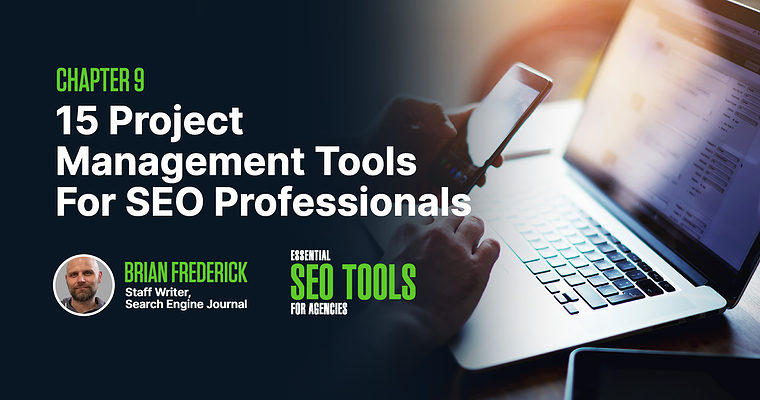
Search engine optimization is complex.
Between changes to search algorithms, new keywords, and strategic changes made by competitors, the field is in a constant state of flux.
If you’re like most SEO pros, at any given time, you’re juggling numerous projects, plans, and tasks.
Just staying organized can feel like a full-time job in itself.
Luckily, you can put technology to work for you in the form of project management (PM) tools.
Why SEO Professionals Need Project Management Tools
If you’re already using a project management platform, you undoubtedly recognize the benefits it provides for busy digital marketers and web teams.
If you’re still getting by without one, you should get one as soon as possible. Why you ask?
Because it can uncomplicate your life and help you get more done in less time.
Some of the essential functions a good project management platform provides for SEO professionals are:
- Accurate planning. From a bird’s eye view of all your campaigns to detailed information on how a specific keyword performs, SEO project management software allows you to create structured plans.
- Task and time management. Whether you’re working solo or as part of a team, PM tools allow you to assign tasks and receive notifications about them, so you can more accurately work hours. This can also be used to generate accurate invoices for your clients.
- Resource allocation. An SEO PM software will give you at-a-glance information about where your budget and resources are going. Useful for SEO, it’s also extremely helpful if you’re also running pay-per-click ads.
- Reporting. Most modern PM platforms offer robust reporting features and dashboards, so you can generate and analyze data to improve efficiency.
It’s easy to see why so many SEO professionals have turned to PM platforms to help them stay organized and productive, but there are a lot of options.
How do you know which one is right for you and your team?
We’ve compiled a list of some of the top ones. Below, you’ll find our choices for the 15 best PM tools with a brief overview of each, including pros and cons.
Our Top 15 Project Management Platforms For SEO
1. Asana
The PM platform used by Search Engine Journal, Asana is a personal favourite.
This cloud-based platform provides a virtual workspace from which your team and various stakeholders can collaborate.
It’s useful for SEO and digital marketing because it allows you to clearly set and manage strategies, goals, tasks, and expectations.
Why It’s Good For SEO:
- Task management: Using the forms feature, you can create standard workflows customized to your SEO processes.
- Automated workflow: Rules-based automation can replace tedious manual tasks.
- Reporting features: Asana has dashboards, charts, and graphs with real-time reporting, so you can get a high-level view or dive into the details.
- Free for up to 15 users: Asana has a free tier that can be used by teams of 15 or less. It includes unlimited tasks, messages, projects, and 100MB of storage for each user.
- Integrations: Asana plays nice with more than 100 other apps and platforms, including Microsoft Office, Dropbox, and Salesforce.
Potential Drawbacks For SEO:
- Unintuitive design: If you’ve never used Asana before, it can be a little challenging to figure out. However, once you’ve mastered the learning curve, it’s quite easy to use.
- No time tracking functionality: There is no built-in time tracking functionality in this platform. This can cause complications in billing clients or resource allocation.
- Not ideal for small teams: With a range of advanced features and capabilities, it can be overwhelming for small teams or limited SEO projects.
2. Monday.com
Garfield may hate Mondays, but SEO professionals who use Monday.com for project management sure don’t.
With an operating system that can be customized to your preferred workflow, it’s a great choice for smaller SEO teams looking for a tool to help them stay on track.
Why It’s Good For SEO:
- Clean user interface: Monday.com has a clean interface that allows you to customize your dashboard and extend data in columns. You can easily get multiple views of an SEO project including calendars, Kanban boards, and collateral.
- Templates: Monday.com has many templates to choose from, so you will likely find one that matches your workflow.
- Notifications and communication: This platform streamlines team communication. Team members can leave comments on tasks or documents and stakeholders can be notified via email.
Potential Drawbacks For SEO:
- Steep learning curve: Like many PM platforms, it can be challenging to get the hang of Monday.com. Bigger tasks with more communication can begin to get a bit unwieldy.
- Slow dashboard loading: It can take some time for your Monday.com dashboard to load, particularly on larger projects where a lot of data has to be transferred from its servers to your computer.
- Client licenses not included: If you want to invite clients to participate in your workspace, you will need to buy a license for them.
3. GanttPro
For more than a century, PM professionals have been using Gantt Charts to track their project schedules.
Top Freelancers for Every Business
Fiverr Business gives your team the flexibility to expand in-house capabilities and execute every project by connecting with vetted freelancers for every skill set you need.
GanttPro is a web-based PM solution based around these visual trackers.
Why It’s Good For SEO:
- Readily understandable: You don’t have to have a project management certificate to track tasks with GanttPro. It gives you status information in an easy-to-understand visual format.
- Undo functionality: A simple mistake doesn’t have to derail your project because this tool saves your history and lets you undo actions with CTRL + Z.
- Customizable fields: You can create custom fields for every task.
Potential Drawbacks For SEO:
- Not as many integrations: Unlike other PM platforms, GanttPro is light on integrations with other apps.
- No billing or invoicing tools: You will need an outside program to generate invoices for your SEO services.
- Manual date input: Changing dates for benchmarks and project completion must be input manually, which some users find tedious.
4. Trello
One of the most popular platforms for project management, Trello uses boards, lists, and cards to help keep you organized.
With a free basic plan, it is useful for SEO teams of all sizes.
Why It’s Good For SEO:
- Free basic plan: Your entire team can try Trello for free. If you like it, there are premium plans available that add integrations, automation, and other functionality.
- Intuitive Kanban boards: Trello’s drag-and-drop card system makes it easy to track the status of any project.
- Useful for campaigns of all sizes: Trello works just as well for huge, complex campaigns as it does for simple projects.
Potential Drawbacks For SEO:
- Kanban-reliant: If you don’t like to use Kanban boards, this is not the PM tool for you, as most of its functionality is built around them.
- Upload sizes limited: Trello restricts free users to 10 MB of online storage and paid users to 250 MB. For most SEO teams this probably won’t be a problem, but you may differ.
- Timeline relationships are not always clear: Trello does not allow users to manipulate relationships for a better understanding of how they work together.
5. Teamwork
Another Kanban-based PM tool, Teamwork offers a drag-and-drop interface with more advanced reporting features.
Teamwork lets you create custom branding accounts, which is useful if you’re working on more than one client.
Why It’s Good For SEO:
- Unlimited users: You can add any number of users to a single task.
- Clear vision of scope: Teamwork’s board view makes it easy to understand what is going on with each project.
- Repeating tasks: Teamwork lets you simply copy any task, which is especially useful for SEO professionals.
Potential Drawbacks For SEO:
- Can be overwhelming: The upside is Teamwork has a lot of features. The downside is all those features can get confusing, especially when you’re a new user.
- No in-platform chat functionality: You’ll need to use an outside app to “chat” with your team and/or stakeholders.
6. Zoho Projects
A cloud-based platform, Zoho Projects provides the functionality you need to manage several SEO projects at once.
You can choose from a limited free version with basic features and four premium plans with different features and user caps.
Why It’s Good For SEO:
- Communication tools: Zoho Project has real-time chat and forum pages, so you can quickly and easily share information with your team.
- Timekeeping: If you bill your SEO clients by the hour, this platform is a good choice because it has excellent time tracking functionality.
- At-a-glance-info: Zoho makes it easy to spot delays, lags, and bottlenecks.
Potential Drawbacks For SEO:
- Features can be overwhelming: Because it offers so much functionality, some users may be intimidated by this PM platform. It also has a steeper learning curve.
- Inflexible: It can be difficult to customize projects to your needs with this platform.
7. Wrike
Wrike can help you simplify planning while keeping your SEO projects on track.
Customizable workflows and ample communication options help you reduce emails, meetings and status updates.
Why It’s Good For SEO:
- Task prioritization: With Wrike, you can push critical tasks to the front to make sure you don’t miss deadlines.
- Natural workflow: Wrike is structured in a way most people will find logical and easy to use.
- Advanced features: Functionality for task management, Gantt charts and real-time newsfeed is built-in.
Potential Drawbacks For SEO:
- Pricier than some options: There is a free version available with limited functionality, but premium plans with more functions are more expensive than other PM tools.
- Difficult onboarding new users: Adding new users and assigning tasks to them must be done manually, which can be time-consuming.
- Can be difficult to navigate: Users who are unfamiliar with Wrike may have difficulty navigating projects.
8. Smartsheet
With project and work management tools, Smartsheet is an online work execution platform that allows you to automate tasks and generate real-time visuals, including Gantt charts and dashboards.
Why It’s Good For SEO:
- Robust communication and collaboration: Smartsheet makes it easy to create and implement communication plans.
- Adding tasks and dependencies: Smartsheet has an intuitive design that allows you to add tasks and dependencies with ease.
- Custom dashboards: Set up your dash to display the information you want.
Potential Drawbacks For SEO:
- Doesn’t support detailed documents: Users are only allowed to upload 10 documents per ticket, which can be troublesome for highly specific campaigns.
- May be too simple for larger teams: If you’re overseeing a big team with many stakeholders, you may find this platform doesn’t include all the functionality you want.
9. Celoxis
Designed to be an all-in-one PM platform for enterprise-level organizations, Celoxis has nearly all the functionality an SEO professional could ever want.
It has high-level visibility and numerous reports, to help your campaigns stay on track and on budget.
Why It’s Good For SEO:
- Easy to use: Celoxis gives you the tools to dive deep into a project, without sacrificing usability. It’s also easy to set up.
- Includes time tracking, resource management, and budgeting: It also has ample reporting features to keep you on track.
- Good value: Celoxis offers the functionality of a top-tier PM platform at the price point of a mid-tier one.
Potential Drawbacks For SEO:
- No billing or invoicing functionality: You will have to use an outside program to bill your clients.
- No free version: If you’re looking for a free-to-use PM platform for your SEO team, this isn’t it.
10. ProofHub
ProofHub doesn’t have as many features as some other PM platforms, but it’s still a good fit for SEO.
It provides a centralized hub for task lists, workflows, calendars, and documents.
Why It’s Good For SEO:
- All the tools you need: ProofHub gives you everything you need for SEO planning, team collaboration, and management.
- Unlimited users: You can add as many people to the platform as you need.
- Communication: All discussions can be centralized in one place thanks to built-in chat and document sharing features.
Potential Drawbacks For SEO:
- Recurring tasks must be entered manually: ProofHub does not provide you with the option to repeat tasks.
- No budgeting: You will need to use a third-party platform to oversee budgeting for your SEO tasks.
11. ClickUp
ClickUp is a cloud-based platform that combines centralized company information and business tools in one place.
It allows you to create and manage to-do lists, workflows, and schedules in a variety of formats.
Why It’s Good For SEO:
- Easy to use: ClickUp has a short learning curve, meaning you and your team can start benefiting from it faster.
- Multiple views: Track your campaigns via a list, board, calendar, and workload view, among others.
- Perfect balance of functions and ease of use: ClickUp falls in the Goldilocks zone by including the features you want without the complexity.
Potential Drawbacks For SEO:
- Navigation can be confusing: The differences between tabs is subtle.
- Implementation can require significant planning: Because it’s highly customizable, you may have to systematically plan workflows to maximize ClickUp’s benefits.
12. Forecast
With Forecast, you can put all your SEO projects, resources, and budgeting in one convenient tool.
An AI-native platform can significantly reduce your administrative workload.
Why It’s Good For SEO:
- Easily track the lifecycle of projects: You can assign and allocate tasks and budget for your entire SEO PM operation through this platform.
- Schedule visualization: You can get information on a team member’s workload at a glance.
- Gathering data is easy: Want to compare a current campaign to an old one? Forecast makes it easy to pull data.
Potential Drawbacks For SEO:
- Updating time and task entries can be tedious: Manual entry can be a time-consuming process.
- Not ideal for larger teams: Visualization elements can be overwhelming if you have a lot of people working under you.
13. Adobe Workfront
Adobe’s solution for project management needs, Workfront is configurable to your needs and includes extensive integrations, so you can easily track the latest developments in your SEO projects.
Why It’s Good For SEO:
- Well-designed user interface: Workfront is easy to use and visually appealing.
- Real-time information: It keeps you abreast of any status changes.
- Good transparency: This platform helps eliminate confusion about who is supposed to do what, as stakeholders and project scope are easily visible.
Potential Drawbacks For SEO:
- Lengthy setup process: A high level of customization means Workfront requires a more in-depth initial setup.
- May offer too much detail: With Workfront, you can get as granular into tasks as you like, which may lead to some people becoming lost in the details.
- Finding tasks can be difficult: If you don’t know what project a task is assigned to, it can be difficult to locate.
14. WorkOtter
With WorkOtter, you can plan resources for your SEO campaigns at a project, rather than task level.
One of the easiest PM platforms to use, it’s an excellent choice for SEO work.
Why It’s Good For SEO:
- Very easy to use: You don’t have to be a tech wiz to use WorkOtter for SEO project management.
- Good communication and reporting tools: Real-time information keeps your entire team on the same page.
- Good for resource management: This platform is useful for deciding exactly where your SEO resources will be allocated.
Potential Drawbacks For SEO:
- Cloud-only: There is no local version available, which can be problematic if you are trying to work offline.
- English-only support: This may present challenges for non-native English speakers.
15. PSOHub
This versatile PM platform is as useful for SEO teams as it is for architect firms or financial companies.
It has predictive project management to allow you to more accurately project how your SEO campaigns will run.
Why It’s Good For SEO:
- Excellent time tracking functionality: PSOHub is one of the best platforms for tracking where your team’s time is going, on both group and individual levels.
- CRM Integrations: This platform integrates with Hubspot and other CRMs, so you can track your SEO campaigns alongside email initiatives.
- Flexible reporting: PSOHub lets you choose the data you want to include in reports.
Potential Drawbacks For SEO:
- Time-consuming setup process: It can take some time to manually enter all your campaigns and tasks into this platform.
- All users must have the same license level: You cannot have some users on a basic level and others on a more complex one.
How To Pick The Right PM Tool For Your SEO Needs
We’ve given you 15 different project management options that can work for your needs as an SEO professional. But how do you pick the right one for you?
It all comes down to your specific needs. Any of these platforms will help you streamline your operations, manage campaigns more effectively, and eliminate wasted time. But each of them has slightly different functionality.
It’s up to you to decide what will work best for your needs. But hopefully, by this point, we’ve given you enough information to get started.
Featured Image: Paulo Bobita/Search Engine Journal
Essential SEO Tools for Agencies
Brian Frederick
Brian is an experienced writer with a background in journalism, marketing and advertising. He has been writing online since the ... [Read full bio]
- Suggested Articles
-
SHARES
-
READS

A quality SEO reporting tool is a necessary investment for any digital agency, large or small.
For one, clients are going to want to see evidence of progress. It’s a whole lot easier to have an automated report with all important key performance indicators (KPIs) delivered on a scheduled basis, rather than manually assembling and cross-referencing data points at the last minute.
Additionally, good SEO reporting software will give you the information you need to flag action items, see the results of experiments, and ultimately run a successful SEO campaign.
There are hundreds of SEO reporting tools on the market, each with its own benefits and drawbacks.
Agency Analytics, SEMrush, Moz, Google Data Studio, Authority Labs, and SE Ranking are just a handful of the resources available to agencies.
Similar to the adage in real estate – pick any two of location, price, or size – as an agency you must weigh the balance of price, features, and ease of use.
For instance Google Data Studio is free and comes jam-packed with rare features like database integration, but there is a steep learning curve.
SEMrush is always adding new features and is relatively easy to use, but it will cost a pretty penny, especially for larger agencies.
What to Look for in SEO Reporting Tools
With so many SEO reporting tools out there, how can you be sure you’re choosing the right software for your agency?
Here are are 13 essential requirements of SEO reporting tools.
1. Accurate & Current Regional Data
SEO reporting is all about data, so it’s important that the software have access to accurate and current data localized to your client’s targeted region.
Search data from the U.S. is meaningless if your client is trying to rank for London plumbing services, so localization matters.
Data must be updated reliably so you can make informed decisions about where your client stands against the competition.
2. Integration with Third-Party Tools
Especially for full-scale digital marketing campaigns, the ability to report on all KPIs in one place is essential.
The more available integrations with third-party tools (e.g., Google Analytics, Google My Business, Majestic), the better.
Some tools even allow you to upload custom data sets.
3. Scalability
You don’t want to have to retrain on or reinvest in new software every time your agency reaches a new tier.
The right SEO reporting tool should work just as well whether you have one client or 200.
4. Strong Suite of Features
A great SEO reporting tool should include:
- Position tracking.
- Backlink monitoring.
- Competitor data.
- Analytics.
It is a bonus if the tool has reporting features for social media, email marketing, call tracking, and/or paid ads to make it a full-suite digital marketing software.
5. Continually Improving & Updating Features
SEO is constantly evolving. So should SEO reporting tools.
As we continue the transition from website optimization to web presence optimization, the ability of reporting tools to integrate new features is essential.
6. Ability to Customize Reports
Each client will have different KPIs, objectives, and priorities.
Reflecting this in reporting is paramount to client retention.
Your reporting software of choice should be able to emphasize the right data at the right times.
7. Client Integration
A good SEO reporting tool must have the client in mind.
It should have a simple bird’s eye overview of the basics, but also be easy for clients to dig into the data at a deeper level.
This can mean automated summary reports or 24/7 client access to the dashboard.
8. Ability to White Label Reports
While white-labeling is not essential (no client will sniff at receiving a report with a Google logo in the top corner), it helps keep branding consistent and gives a professional sheen to everything you send a client’s way.
9. Access to Support Resources
When you encounter a roadblock, quality support resources can help you find a detour.
Whether it’s detailed support documentation, a chat feature/support desk, or responsive customer support on social media, finding the help you need to solve the issue is important.
10. Cost-to-Value Ratio
With a proper process, time investment, and leveraging support resources, it is entirely possible to get better results out of a free reporting tool than one that breaks the bank.
No matter what, though, you want to keep costs reasonable.
The last thing you want is a reporting software that causes hesitation in expanding your staff or client base due to the associated cost.
11. Ability to Export Reports
Even if clients are given unrestricted access to the dashboard, you want reporting that is even more accessible.
The ability to export all data via PDF, CSV, XLS, or email is important.
12. Automation
With the ability to automatically send reports on a recurring basis, you can save time and money and dedicate those resources elsewhere.
13. Ease of Use
There is value in intermediate and advanced reporting tools that might take longer to learn but facilitate more complex analysis.
In general, however, the ability to quickly get new users up to speed is important, whether they are clients or staff.
Top SEO Reporting Tools
In evaluating five of the most popular SEO reporting tools, based on the above criteria, here is how they stack up:
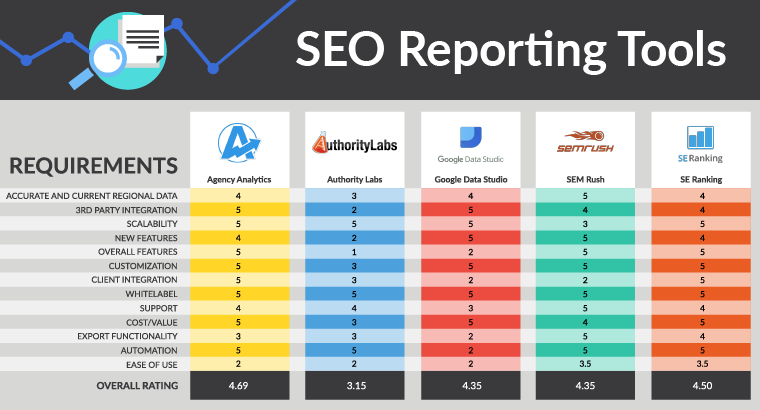
In considering all requirements, Agency Analytics stands as the best value in my opinion, followed by SE Ranking, SEMrush, Google Data Studio, and Authority Labs.
1. Agency Analytics
My Overall Rating: 4.7/5
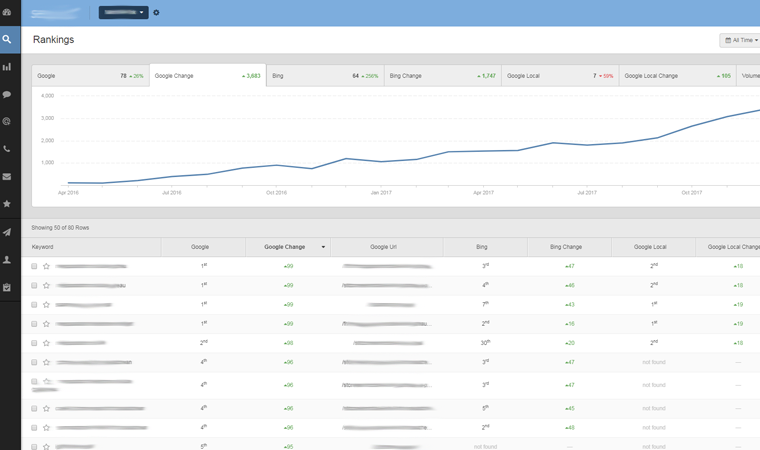
Agency Analytics is a quality introductory/intermediate reporting tool for agencies. Among the tools on this list, it is one of the most cost-effective and easy to use for small to mid-sized agencies.
It starts at $49 per month with unlimited staff and client logins, a white-label dashboard, and automated branded reports. You can also purchase additional campaign and keyword credits if you hit the default cap.
Agency Analytics comes with 30+ third-party data integration, from the basics like keyword rankings and Google Search Console to integrations with call tracking software, email marketing software, and more.
However, this reliance on third-party data means if there is an interruption in the transmission, you may have incomplete reports.
Though new integrations are always being added, they can be glitchy at first which makes them unreliable to share with clients until stabilized.
With the ability for clients to log in and view daily data updates, it provides real-time transparency.
Automated reports can be customized, and the drag-and-drop customized dashboard makes it easy to emphasize priority KPIs.
2. SE Ranking
My Overall Rating: 4.5/5
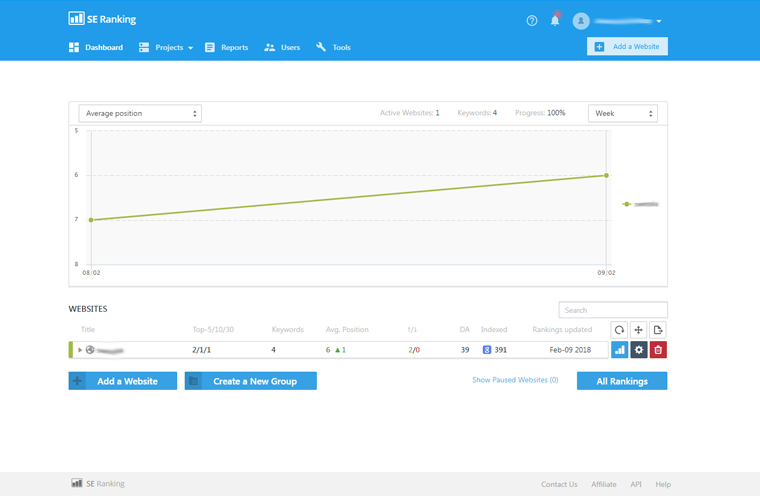
The most cost-effective of the tools on this list, SE Ranking has plans starting at just $7 per month – though the minimum of $39 per month plan is necessary for agencies monitoring multiple websites.
Setup is a breeze, as the on-screen tutorial guides you through the process.
SE Ranking features a strong collection of SEO-related tools, including current and historical position tracking, competitor SEO research, keyword suggestion tool, backlink explorer, and more.
SE Ranking is hooked up with Zapier, which allows users to integrate more than 1,000 apps and provide a high level of automation between apps like Klipfolio, Salesforce, HubSpot, and Google Apps.
At a beginner to intermediate level, SE Ranking is an effective SEO reporting tool.
You may want to look in a different direction if your agency requires more technical implementations or advanced customization.
3. SEMrush
My Overall Rating: 4.4/5

SEMrush is one of the most SEO-focused reporting tools on the list, which is reflected in their features. Starting at $99 per month per user, SEMrush provides a full suite of tools that can be learned at an intermediate level.
A major downside of SEMrush, especially for cost-conscious agencies, is that an account comes with only one user login.
Having to purchase individual licenses for each SEO analyst or account manager adds up quickly and everything but the business license caps out at three users per account. This makes scalability an issue.
SEMrush has both branded and white label reports, depending on your subscription level. It uses a proprietary data stream, tracking more than 800 million keywords.
The ever-expanding “projects” feature covers everything from position tracking to backlink monitoring and social media analysis.
Though it doesn’t fall specifically under the scope of SEO reporting, SEMrush’s innovation makes it a one-stop shop for many agencies.
Project features include Ad Builder, which helps craft compelling ad text for Google Ads, to Social Media Poster which allows agencies to schedule client social posts.
Combining such diverse features under the SEMrush umbrella offsets its relatively high cost, especially if you can cancel other redundant software.
4. Google Data Studio
My Overall Rating: 3.6/5
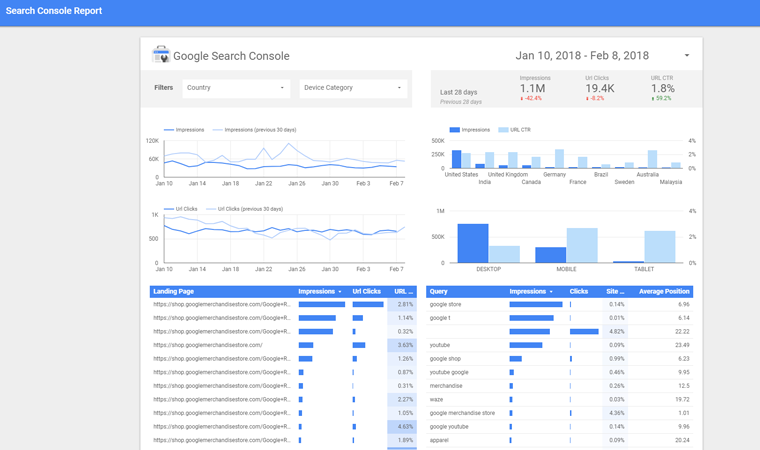
Currently in beta, Google Data Studio is one of the newest offerings from the Mountain View megacorp.
Though it is much more technical and requires more time investment to set up than most other tools on this list, it should be intuitive for staff who are familiar with Google Analytics.
If you’re on the fence, GDS is completely free.
A major upside to GDS is superior integration with other Google properties like Analytics, Search Console, Ads, and YouTube.
Like other reporting tools, it also allows third-party data integration, but the ability to query data from databases included MySQL, PostgreSQL, and Google’s Cloud SQL sets it apart.
With proper setup, you can customize reports with important KPIs, pulling from lead information and customer information. For ecommerce clients, you can even integrate sales data.
Though initial setup will be much more technical, the ability to import templates saves time and effort.
You can also create your templates, which better reflect your processes and can be shared across clients. Google also has introductory video walk-throughs to help you get started.
5. Authority Labs
My Overall Rating: 3.2/5
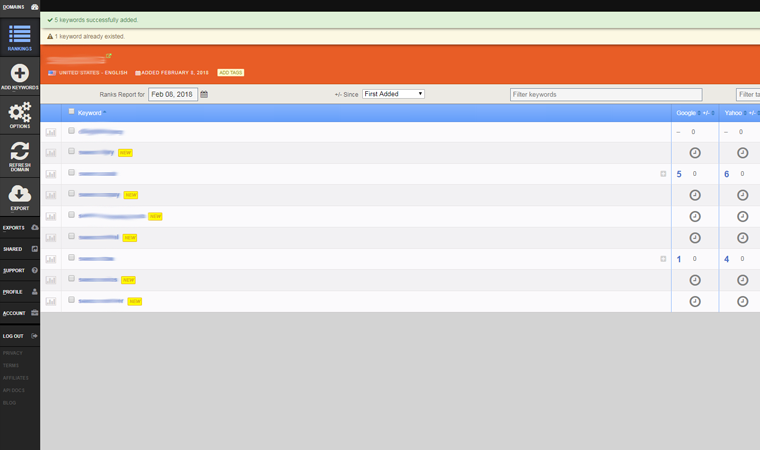
If you’re looking for a straightforward position tracking tool, Authority Labs gets the job done.
Authority Labs is $49 per month for unlimited users, though for white label reporting you will need to upgrade to the $99 per month plan.
You can track regional ranking data, get insights into “(not provided)” keywords, track competitor keywords, and scheduled automated reporting.
However, the lack of other essential features like backlink monitoring or analytic data means you will have to supplement this tool to provide a full SEO reporting picture for clients.
Conclusion
There are many quality SEO reporting tools on the market.
SE Ranking has fantastic cost to value ratio, while Google Data Studio has advanced reporting capabilities if you can withstand a higher barrier to entry.
Agency Analytics prioritizes client access, which is a big deal if transparency is a core value for your agency.
Authority Labs keeps it lean and clean, while SEMrush is always adding innovative features.
Consider what matters most to your agency. Is it:
- Feature depth?
- Scalability?
- Cost-to-value ratio?
Once you weigh the factors that matter most for your agency, you can find the right SEO reporting tool.
Image Credits
All screenshots taken by author, February 2018
Recommend
About Joyk
Aggregate valuable and interesting links.
Joyk means Joy of geeK
